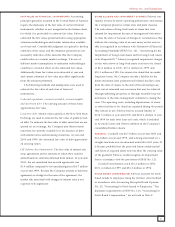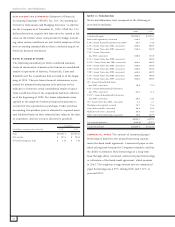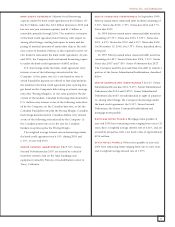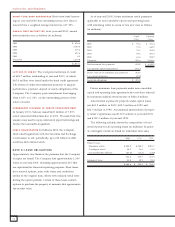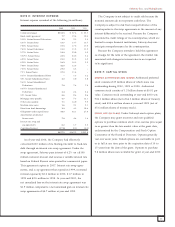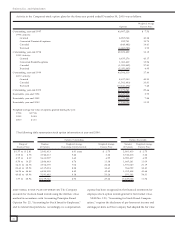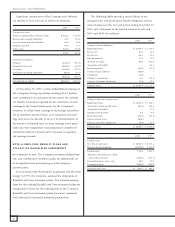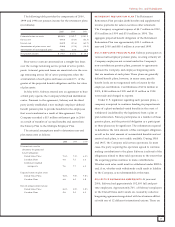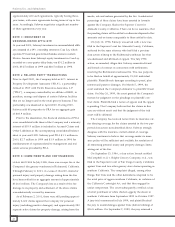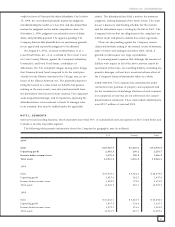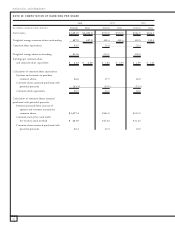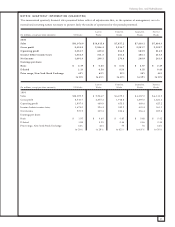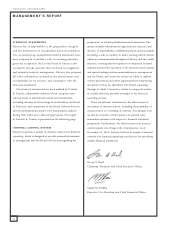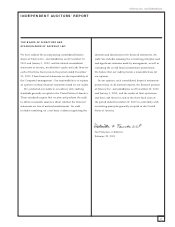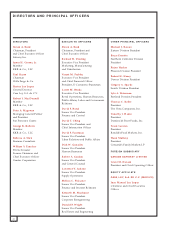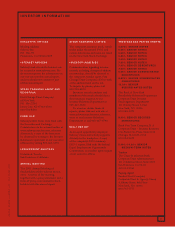Safeway 2000 Annual Report Download - page 42
Download and view the complete annual report
Please find page 42 of the 2000 Safeway annual report below. You can navigate through the pages in the report by either clicking on the pages listed below, or by using the keyword search tool below to find specific information within the annual report.
Safeway Inc. and Subsidiaries
40
approximately 400 such agreements, typically having three-
year terms, with some agreements having terms of up to five
years. Accordingly, Safeway negotiates a significant number
of these agreements every year.
NOTE I: INVESTMENT IN
UNCONSOLIDATED AFFILIATE
At year-end 2000, Safeway’s investment in unconsolidated affili-
ate consisted of a 49% ownership interest in Casa Ley, which
operates 97 food and general merchandise stores in western
Mexico. Income from Safeway’s equity investment in Casa Ley,
recorded on a one-quarter delay basis, was $31.2 million in
2000, $34.5 million in 1999 and $28.5 million in 1998.
NOTE J: RELATED PARTY TRANSACTIONS
Prior to April 2000, the Company held an 80% interest in
Property Development Associates (“PDA”), a partnership
formed in 1987 with Pacific Resources Associates, L.P.
(“PRA”), a company controlled by an affiliate of KKR, to
purchase, manage and dispose of certain Safeway facilities
that are no longer used in the retail grocery business. This
partnership was dissolved in April 2000. During 2000,
Safeway sold 48 properties to PRA for an aggregate gain
of $40.9 million.
Prior to the dissolution, the financial statements of PDA
were consolidated with those of the Company and a minority
interest of $19.9 million is included in Accrued Claims and
Other Liabilities in the accompanying consolidated balance
sheet at year-end 1999. Safeway paid PDA $1.1 million in
2000, $2.7 million in 1999 and $1.9 million in 1998 for
reimbursement of expenses related to management and real
estate services provided by PDA.
NOTE K: COMMITMENTS AND CONTINGENCIES
LEGAL MATTERS In July 1988, there was a major fire at the
Company’s dry grocery warehouse in Richmond, California.
Through February 2, 2001, in excess of 126,000 claims for
personal injury and property damage arising from the fire
have been settled for an aggregate amount of approximately
$124.4 million. The Company’s loss as a result of the fire
damage to its property and settlement of the above claims
was substantially covered by insurance.
As of February 2, 2001, there were still pending approxi-
mately 2,600 claims against the Company for personal
injury (including punitive damages), and approximately 290
separate active claims for property damage, arising from the
smoke, ash and embers generated by the fire. A substantial
percentage of these claims have been asserted in lawsuits
against the Company filed in the Superior Court for
Alameda County, California. There can be no assurance that
the pending claims will be settled or otherwise disposed of for
amounts and on terms comparable to those settled to date.
On July 10, 1998, Safeway was served with a new case
filed in the Superior Court for Alameda County, California,
authored by the same attorney who had filed a previous
class action relating to the Richmond warehouse fire that
was dismissed and affirmed on appeal. The July 1998
action, as amended, alleges that Safeway committed fraud
and breach of contract in connection with settlements
involving the Richmond warehouse fire. The case purports
to be filed on behalf of approximately 21,500 individual
plaintiffs. Plaintiffs seek damages according to proof, plus
interest and punitive damages. On March 5, 1999, the
court sustained the Company’s demurrer to plaintiffs’ fraud
claim. On May 20, 1999, the court granted the Company’s
motion for judgment on the pleadings on plaintiffs’ con-
tract claim. Plaintiffs filed a notice of appeal, and the appeal
is pending. The Company believes that the claims in this
case are without merit and that the judgment of the trial
court will be affirmed.
The Company has received notice from its insurance car-
rier denying coverage for the claims asserted in the two pur-
ported class action suits described above. Safeway strongly
disagrees with the insurance carrier’s denial of coverage.
Safeway continues to believe that coverage under its insur-
ance policy will be sufficient and available for resolution of
all remaining personal injury and property damage claims
arising out of the fire.
On September 13, 1996, a class action lawsuit entitled
McCampbell et al. v. Ralphs Grocery Company, et al., was
filed in the Superior Court of San Diego County, California
against Vons and two other grocery store chains operating in
southern California. The complaint alleged, among other
things, that Vons and the other defendants conspired to fix
the retail price of eggs in southern California, in violation of
the California Cartwright Act, and that they engaged in
unfair competition. The court subsequently certified a class
of retail purchasers of white chicken eggs by the dozen in
southern California from September 1992 to October 1997.
A jury trial commenced in July 1999, and plaintiffs asked
the jury to award damages against Vons (before trebling) of
$36.8 million. On September 2, 1999, the jury returned a



